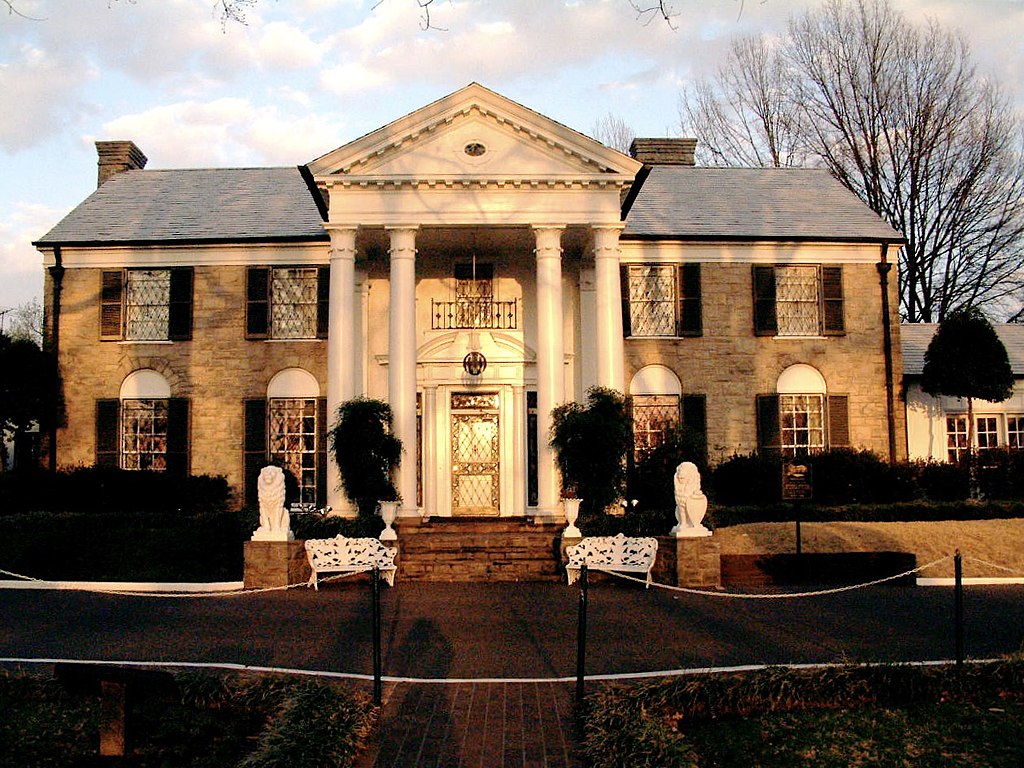The organization that tried to sell Elvis Presley’s infamous Graceland estate out from under actress Riley Keough is allegedly led by a Nigerian scammer.
Nigerian scammer goes after Elvis’ Graceland
The insane events unfolded in September when Naussany Investments & Private Lending LLC, started pestering Keough, Lisa Marie Presley’s oldest daughter, accusing her late mother of using Graceland as collateral for a loan in 2015 and had failed to settle it by the 2022 deadline.
When Elvis’ granddaughter didn’t give in to the alleged company’s $3.8 million demands, Naussany proposed a $2.8 million settlement and subsequently filed a collection claim in a Los Angeles court, which also proved unsuccessful.
In retaliation, Naussany placed a classified advertisement in a local Memphis newspaper announcing a foreclosure sale on the steps of a Memphis courthouse on May 23, promising Graceland would be sold to the “best and highest bidder.”
That’s when Keough filed an injunction to stop the sale and her attorney, Jeff Germany, exposed the fraudulent nature of the documents in court, which he claimed were inauthentic.
According to Keough’s lawsuit, a man going by the name Gregory Naussany had sent multiple emails demanding payment for her mother’s fake debt, which included a promissory note and a 2018 deed of trust for Graceland, which were allegedly signed by Lisa Marie.
The deed of trust was allegedly notarized by Kimberly Philbrick, a notary from Duval County, Florida, who told the court that she had “never met Lisa Marie nor notarized any document for her.”
Additionally, the deed of trust claimed to have been notarized online, which was not a service available Florida until 2020, two years after the document was purportedly created.
Keough’s lawsuit asserted, “While the documents bear signatures that look like the signatures of Lisa Marie Presley, Lisa Marie Presley did not in fact sign the documents.”
The suit also claimed that both documents were “products of fraud” and the people who had created them were “believed to be guilty of the crime of forgery.”
The company’s mailing address was also a point of contention. The return addresses in Jacksonville, Florida and another in Missouri were both PO Boxes.
Germany’s assertions about the fraudulent nature of the documents were not contended in court, because representatives from the company didn’t bother showing up.
During a Wednesday hearing, the presiding judge, Chancellor Jenkins revealed that his office had received a faxed document for an application for an extension from someone identifying as Gregory Naussany, which he denied.
The document said that Keough’s claims about Graceland were “unfounded” and undeserving of an injunction. The faxed document also requested an opportunity to present a defense.
However, upon contacting the email listed on the filing, Naussany declared he was “withdrawing all claims with prejudice,” which waived his right to refile in the future.
Naussany explained in the email, “Due to the deed of trust not being recorded and the loan being obtained in different state, legal action would have to be filed in multiple states and Naussany Investments & Private Lending will not acquire to proceed.”
The email also said that the decision was made after consulting with company lawyers, who decided that Keough meant “no harm” despite her mother’s mismanagement of money.
New York Times uncovers how a Nigerian scammer targeted Graceland
After the case was dropped by Naussany, The New York Times managed to get a startling from the email listed on court documents.
The person they contacted admitted to being the head of a scam network targeting deceased individuals, the elderly, and other unsuspecting Americans.
Details from “gullible” victims’ birth certificates and identification documents, mainly in California and Florida, were exploited to facilitate their scams.
“I am the one who creates trouble,” Naussany confessed. “We figure out how to steal. That’s what we do, I had fun figuring this one out and it didn’t succeed very well.”
The scammer acknowledged their defeat and commended Keough for outsmarting them.”[Your] client [doesn’t] have nothing to [worry about]… win [for] her,” he wrote back in broken English. “She beat me at my own game.”






